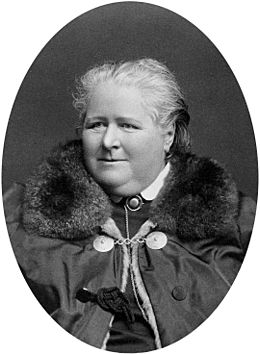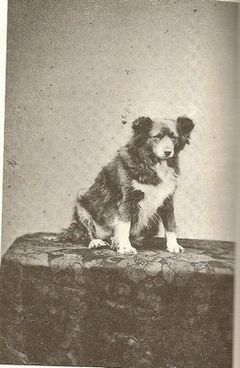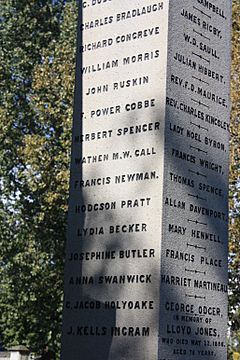Frances Power Cobbe facts for kids
Frances Power Cobbe (born December 4, 1822 – died April 5, 1904) was an important writer and thinker from Ireland and England. She was a social reformer, meaning she worked to improve society. She was also a strong activist against vivisection, which is using animals for experiments. She was a leading campaigner for women's suffrage, which means women's right to vote.
Frances Power Cobbe started several groups to help animals. These included the National Anti-Vivisection Society (NAVS) in 1875 and the British Union for the Abolition of Vivisection (BUAV) in 1898. She was also part of the main council for the London National Society for Women's Suffrage. She wrote many books and essays, sharing her ideas on morals, women's roles, and animal rights.
Contents
About Frances Power Cobbe's Life
Frances Power Cobbe was born into the well-known Cobbe family. Her family lived at Newbridge House in County Dublin, Ireland.
She worked at the Red Lodge Reformatory for a short time. This was a school that helped young women.
Frances Power Cobbe shared her life with Welsh sculptor Mary Lloyd (1819-1896). They met in Rome in 1861 and lived together from 1864. Mary Lloyd's death in 1896 greatly saddened Frances. A friend wrote that the joy in Frances's life seemed to disappear. Their friendship was described as "perfect in love, sympathy, and mutual understand."
Around 1891, they received a large gift of money. This helped them keep their home at Hengwrt in Wales. Frances Power Cobbe and Mary Lloyd are buried together. Their grave is at Saint Illtyd Church Cemetery in Llanelltyd, Wales.
Working for Animal Rights
Frances Power Cobbe founded the Society for the Protection of Animals Liable to Vivisection (SPALV) in 1875. This was the world's first group to fight against animal experiments. In 1898, she started the BUAV. Both groups are still active today.
Fighting for Women's Rights
She was a key member of the London National Society for Women's Suffrage. She wrote articles for London newspapers. These articles supported women's right to vote and women's property rights. Around 1880, she also helped start Homes for Workhouse Girls. These homes provided a safe place for young women.
Her Ideas and Writings
Frances Power Cobbe believed that morals and religion were connected. She thought that our moral duties came from a divine law. She wrote about many topics. These included how we know what is right, beauty, the mind, and life after death. Her ideas are now being rediscovered by people studying the history of philosophy.
She also strongly supported women going to university. She believed women should study the same subjects as men. They should also take the same exams and earn degrees. She gave an important speech about this in 1862.
Meeting Charles Darwin
Frances Power Cobbe met the Darwin family in 1868. Emma Darwin, Charles Darwin's wife, found her very pleasant. Frances encouraged Charles Darwin to read some philosophical works. She met him again in Wales in 1869. She later lost his trust when she published a letter he wrote to her without his permission.
Honors and Recognition
Frances Power Cobbe has been honored in several ways.
- A portrait of her is part of a large mural. This mural was painted by Walter P. Starmer in 1921. It is in St Jude-on-the-Hill church in London.
- Her name and picture are on the base of the statue of Millicent Fawcett. This statue is in Parliament Square, London. It was revealed in 2018.
- Her name is also listed on the Reformers Memorial. This memorial is in Kensal Green Cemetery in London.
- A special professorship at the Graduate Theological Foundation is named after her. It focuses on animal theology.
See also
 In Spanish: Frances Power Cobbe para niños
In Spanish: Frances Power Cobbe para niños




